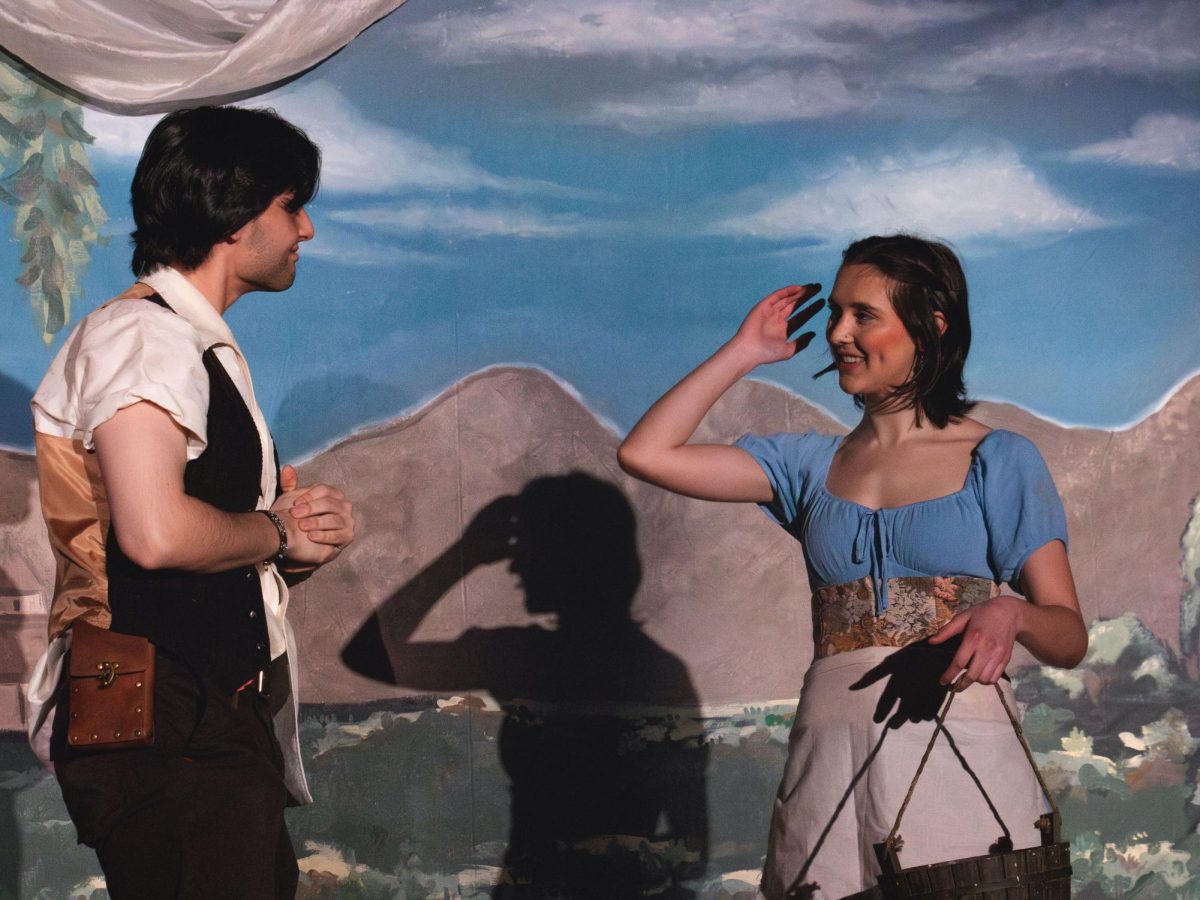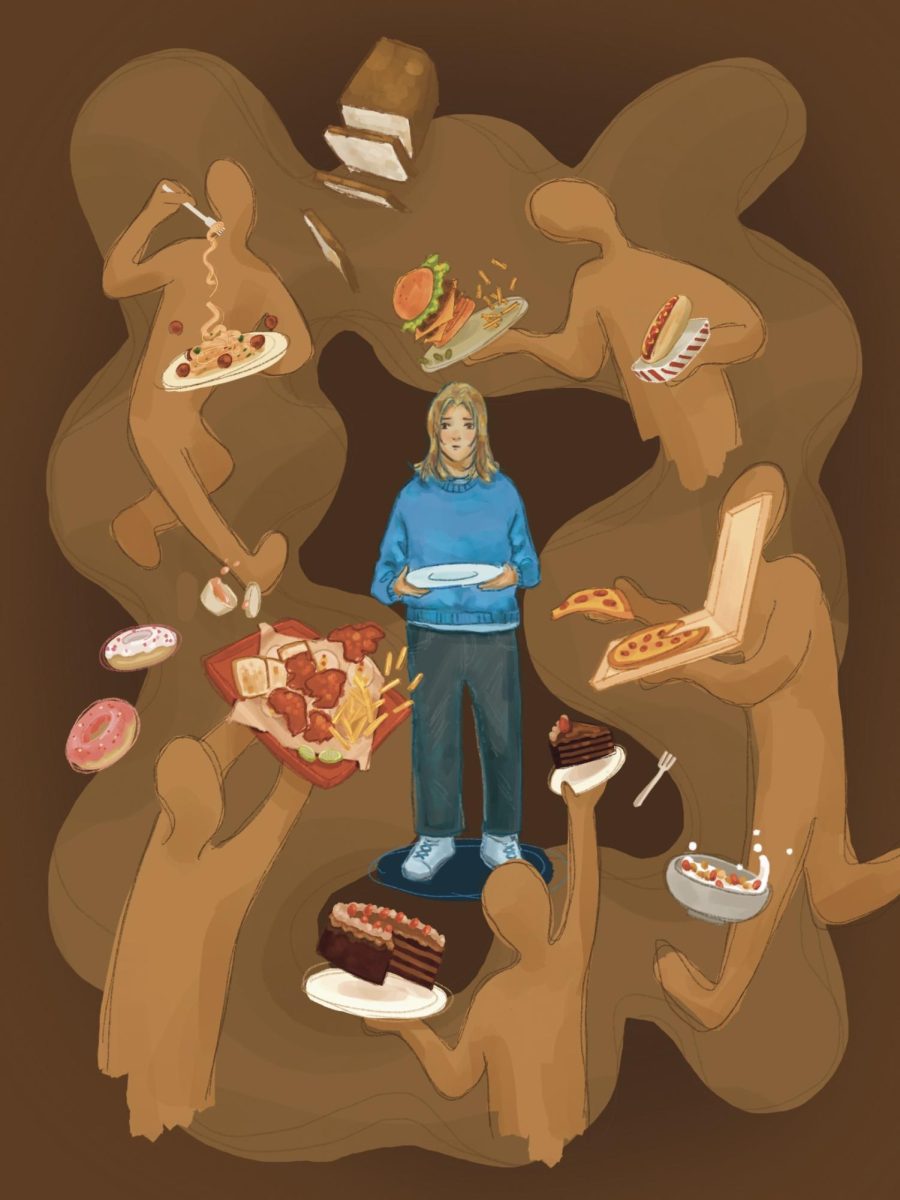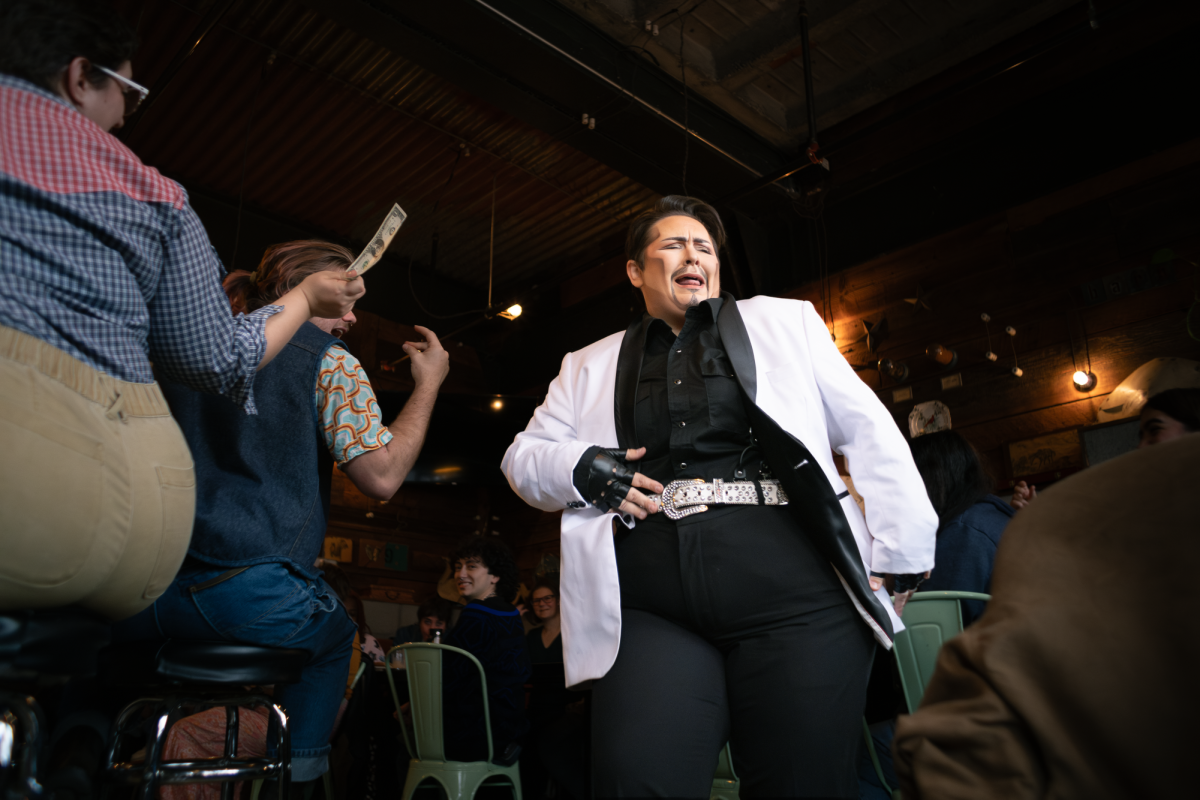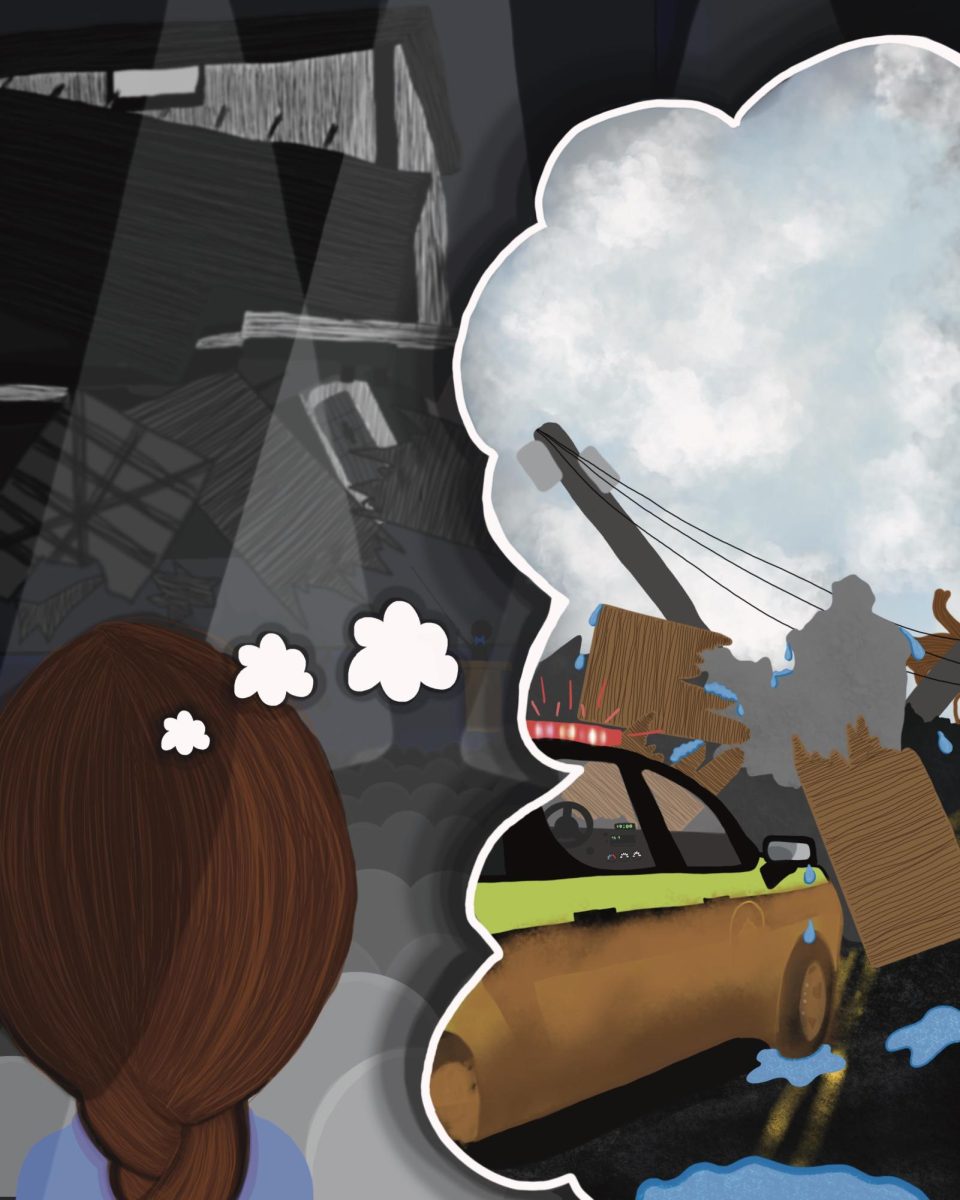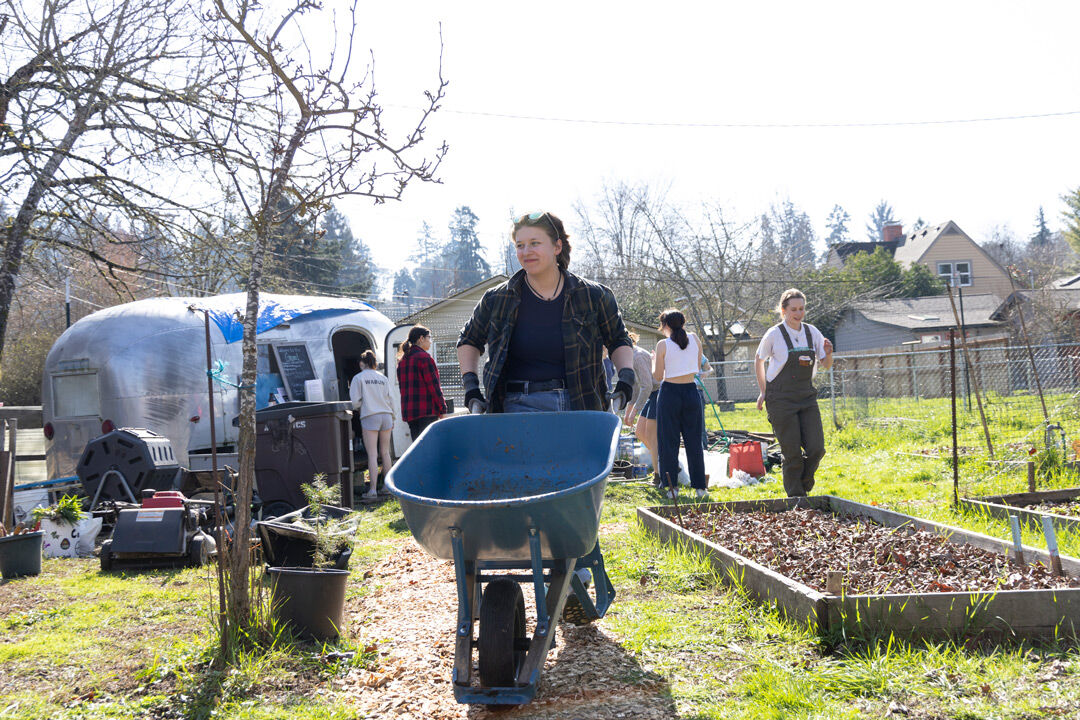CONTENT ADVISORY: Sexual Violence.
Take Back The Night is a global event that inspires survivors and allies to march, protest and share their experiences around sexual violence. It’s a night of empowerment, support and radical protest for many survivors.
Due to the pandemic, Take Back the Night can’t happen in its normal capacity, but that doesn’t mean we stop sharing our stories. I wanted to share my story in our magazine hoping it would help others and create an opportunity for other survivors to do so as well. Ethos has partnered with several UO students and alumna who are survivors of sexual violence to create a platform for us to share our experiences.
The following stories describe sexual assault, rape and domestic violence and are at times graphic in detail. Our goal is not to trigger others by sharing these stories, but to normalize conversations around sexual violence, amplify survivor voices and create a space where others can recognize their own experiences in ours and know they’re not alone. We refer to survivors by their first names so that no harm comes to them as a result of this publication.
As long as survivors share their experiences and refuse to be silent, we are fighting against sexual violence and taking back what is ours. And that is why we are sharing our stories with you today. Thank you to all the brave survivors who submitted pieces for this project and trusted our publication in this process.
If you would like to share your story of sexual violence and be a part of the online version of this project, please email [email protected]. Submissions will be accepted from the UOcommunity through April for Sexual Assault Awareness Month.
—Jozie Donaghey, Ethos Photo Editor
Lydia’s Story
I want to write about healing. Much of my life has been devoted to the act of untangling, an important task. I tug at the episodes of violence, the small cuts penetrating deep into the canyons of my being, the fear etched into me.
But living in the past keeps me tied to violence. I want to open the door and walk into the future.
I want to write what I know about healing. If I’m honest, I know very little. What I know is that there are moments where the sun breaks free, escaping the clouds, and the rays hit your skin, and you remember that you are breathing. These are the moments we must embrace tightly and tenderly.
I believe healing works the way trees grow. We can be born of the same stuff, but our roots and our branches will never mirror each other. This is to say that what has been healing for me, may not be healing for you, and this is okay.
For me, healing looks like storytelling. Beginning abruptly, the words spill out of my mouth,. “I think I wouldn’t be so scared if I had never been assaulted”. As the shock subsides, telling becomes easier. The words flow gently from my mouth to the hearts of loved ones who say, “I’m sorry” and “Me too”.
Telling looks like finding new words. I collect words, like rocks at the beach, that help me tell. These words help me tell stories about surviving, desire in the face of danger, and of healing. The question, “why didn’t you tell?” plagues me. Now, Healing is telling my story with my voice and my words.
I’m writing about healing. Untangling the threads of violence is a lifelong feat, but I need to walk into the future. I feel the sun soak into my skin. I am breathing.
Eve’s Story
I was raped while hitchhiking, and I never reported it to the authorities. It was back in 1972; I was 19 years old. I got into an old truck driven by a single guy. The passenger door didn’t work very well, and he had to wrench it to get it to open. I was traveling from Canoga Park to Inglewood, a drive of about 28 miles, all within Los Angeles County. We rode on the freeway for a while. He exited at Haskell or Hayvenhurst, I forget which, but both of these exits empty directly into lonely, suburban neighborhoods of tract homes. He pulled over to the curb on a quiet street with no pedestrians in sight.
His intent was obvious immediately, as he moved over into my space. My resistance was feeble, and as soon as I objected, he grabbed my throat with both hands. Placing his thumbs near my Adam’s apple, he gave me a shake. The message was clear: He would not hesitate to hurt me. I made a quick calculation that I would prefer not to be beat up. I fantasized about trying to climb out the window. But to where? I decided to go limp to avoid serious bodily injury, maybe it would be over soon, and I could survive without physical trauma.
He quickly ripped off my panties. It was over in about two minutes. In the end, he added insult to injury with a sneer. “That wasn’t so bad, was it?” he said. Then he got behind the wheel and drove me two blocks to a big street, Ventura Boulevard, where I could hitch my next ride. On exiting the truck, he had to lean over me to open the door.
As he drove away, I wrote down his license number. I had another 17 miles to my destination, so through my tears, I stuck out my thumb for another ride. I was picked up by an angel. It happened to be a minor celebrity, an FM DJ I was familiar with, Richard Kimball. I told him I had just been raped, and he generously drove me out of his way, all the way home to Inglewood.
I then had another decision to make. To report or not? I was hitchhiking. I was also wearing the “wrong clothes.” It had been a hot summer day, and my dress was short — what could be called revealing. It had a high collar with cutaway sleeves. I knew that if I reported this crime, what had taken a total of fewer than 10 minutes would turn into many hours of being treated like it was my fault. I was not afraid to testify. I was afraid the cops would treat me like the perpetrator. This was before the days when women cops were assigned to cases like this. I have heard that even now, with women cops and DNA, the ordeal with reporting is grueling. It seems an attorney or representative by the victim’s side would be essential to protect an already traumatized and vulnerable person.
I eventually threw away that license number and decided to put the experience behind me. I have never told my story in a public forum before.
Miranda’s Story
I remember running down the dark street naked and terrified, fleeing the house where I’d picked the lock on my cage in the basement; A dog crate where the men had taken me and brought me back as it pleased them throughout the night. I was 12 and had been missing for 3 days. Now I ran down a dark street, naked and at the mercy of the neighbors that answered their door late at night in Salt Lake City, UT. Terrified, they called the police. An officer answered the call and, uncomfortable by my state as it must’ve meant I was up to things a good, mormon girl shouldn’t be up to, brought me to the edge of my block and drove away. He didn’t drive me to my house, get my information or make any sort of report. A twelve-year-old girl he found naked and beaten who ran to the neighbors after a kidnapping, and he dropped me off a block from my house, naked and alone in the dark. And people wonder why we don’t report.
I don’t often tell my story. Both because I struggle with persistent PTSD, flashbacks and nightmares everyday, but also because my story feels so different and extreme. I’ve always struggled with the words of my story, the shock and horror in people’s faces when I tell them. Surviving child sex trafficking is not a typical experience, and even when I tell my story to get some reprieve from the pain, I feel guilty and afraid I’m invalidating the experiences of other survivors. How can I be selfish and steal the attention, when my experience feels so isolated and uncommon? How can I share my story with other survivors, when by doing so I make their experience feel less-than, invalid? I feel trapped and alone: Therapists in town aren’t trained for my experience, my family and friends struggle to comfort me and I feel terrible guilt because I feel sharing my experience falsely portrays the experience of most survivors and invalidates them.
But what I’m learning is that those feelings of shame, guilt and isolation, that my experience is too unique to be valid, or too hard to hear to share, or too painful for others so I must bear the weight myself, are things that all survivors feel. I’m learning that other survivors fear their experiences aren’t as valid as mine, they feel it’s “not as bad” as my own. I tell them their experiences are valid, but to do that I must accept that my story is valid too. My story is part of the narrative of the horrendous sexual violence that all people, and children, experience across the globe. Sex trafficking survivors are not rare in existence, but rare in appearance, and are vital to the truth of sexual violence in our culture. Sex trafficking doesn’t just happen in third world countries or scary movies. It happens right next door in quaint, mormon neighborhoods on quiet evenings.
Sexual violence isn’t just domestic violence. It isn’t just date rape or serial gropers hiding in parks. It isn’t just a twelve-year-old girl getting kidnapped and having her virginity put up for sale at $15,000. Sexual violence is a tool of power for institutional and social oppression to marginalize all walks of people. It is a disease that goes unnoticed, untalked about, and uncared for every day, while more people become survivors like me. Like you. Like the rest of us, regardless of our individual experiences. Sexual violence is never an isolated experience, and when you find one survivor you will always find more.
Now I know I am not alone. Now I’m willing to share, for you and for me.
Alexus’s Story
I was 17 when my father decided to leave my stepmother.. Feeling uncomfortable staying with her while my father figured out his next step, – I stayed with my boyfriend who had offered to let me stay with him for a week. I should preface this with the fact he had already been rough with me once while at a party, and I had chalked it up to being drunk.
We arrived at his house and had made plans with a few of his guy friends to barbecue while his family was out of town. Everyone had arrived but I was tired and starting to get anxious. So I decided that a nap would do me good. I woke up to hands raking my body, my face shoved between a pillow and an old high school sweatshirt. I woke to intense blinding pain, this boy hovering over me, while he held me down. I struggled to move and disengage from him. But the more I cried or moved the rougher he was with me. I began banging on the bedroom wall and screaming for help. But the door stayed closed. And eventually, he finished. He rolled off of me and kissed my forehead. Told me that he loved me. I laid there and counted his breaths until he had fallen asleep and then made my way down the stairs, naked. Sitting in the living room were all five of his friends. Watching TV. I stood in the foyer, my hands covered in my own blood and more dripping down my legs. Only one of them looked at me. I remember the shock on his face, but all he did was wave.
I locked myself in the downstairs bathroom for what seemed like forever. My throat was raw and every muscle felt like it was new and untrained. I managed to clean myself up and tried to call my father. He never answered. My boyfriend was never charged.
I was 17 then, I am 23 now. This experience has caused perhaps a lifelong fear of giving people power over me, of allowing myself to be vulnerable physically with any partner I may choose to have. It has made me second guess the genuine care of everyone I meet. Has made me question my worth. Made me afraid of physical intimacy. Made me feel that perhaps that was the only way I was to be seen. The PTSD manifests in many ways: I couldn’t have the bathroom door locked for a long time, and I always slept with some sort of light on. Bathrooms made me feel trapped, and at any second I could be reliving the rape. Almost a constant fear of being backed into a corner. I began tucking myself between pillows at night in an attempt to feel nested and slept with the light on because when I opened my eyes everything in the room was in immediate view. It helped the panic attacks become less frequent. It’s just as uncomfortable to write as it is to read. But I need the person reading this to know that a partner should never take advantage of you. You can always say no. And you are never in the wrong for taking away consent. You are valid.
Liz’s Story
We were making out on my bed. It was rare that we would kiss like this. He said he didn’t like the way making out felt. I knew what it meant when he would kiss me like this; when he would slide his tongue into my mouth and slobber all over my upper lip. I could feel his erection on my thigh.
“I would really appreciate it if we could just stick to rubbing, OK?”
“Yeah, that’s fine.”
He took hold of my hand and put it on his jean zipper. I felt a knot growing in my chest, but I knew what to do from there. He propped me up slightly and started kissing me again, one hand now making its way under my shirt, the other slipped under my shorts. For a moment, just a brief moment, it was nice.
I let my brain slip away into passion and romance. For a moment I felt safe.
With no warning several of his fingers tore into me. Suddenly and with force, he began forcefully fingering me for what felt like a lifetime. Tears welled up in my eyes. I couldn’t breathe. He just kept going; I wasn’t ready. My body was shaking. The voice inside of me to speak up was gone, so I waited for him to finish.
Then he was done. He gave me a kiss on the nose, extra slobbery because of an inside joke we had and grinned.
“Sorry,” he said. “I couldn’t help myself.”
What came after is blurry. I must have laughed it off, told him it was OK, because at the time, I actually thought it was. He was my boyfriend, I loved him, and he loved me, right?
The feeling of being violated didn’t go away when he left that night. My bed felt wrong and unfamiliar; my childhood bedroom walls had seen too much. I stayed awake at night thinking about it, sick to my stomach.
When I saw him next, I was shaking again. I brought him to my room and shut the door. Before he could say anything I found the courage to say, “I think that might have been rape.”
When he started crying, I had no idea what to do. He sat on my bed and put his head in his hands. “I can’t believe it,” he cried. “I never thought I would be that kind of guy!” He was sobbing at this point, so I sat next to him and did the only thing I could do: comfort him. “After everything you’ve been through,” he said. “How can you possibly ever trust me again?”
But I did trust him again. I assured him that I loved him, that I knew he wasn’t that kind of guy deep down, and that we were going to be okay.
What followed was months of him pushing my boundaries, emotionally and physically. He began hitting me in the face during sex, as well as ghosting me for long periods of time. I was so in love with him that I allowed that treatment until the very end.
I wish I had the satisfaction of leaving him, but he left me heartbroken after dumping me over a text message.
Maya’s Story
“I had it coming.”
“It’s not your fault.”
“No. You don’t understand. I had it coming.”
“It’s not your fault.”
“I was wearing a short skirt. I had it coming.”
“It’s not your fault.”
“I led him on. I had it coming.”
“It’s not your fault.”
My dorm’s resident assistant held me as I shook nervously sitting in the Dean of Students office. I was nineteen. It was clear I could not sit still, and he was trying to be a comforting presence. I heard his words, “it’s not your fault,” echoing the whole time I was there. He was more than my RA. He was one of my closest friends, a mentor, and someone who I looked up to like an older brother. He was furious when I told him about the “terrible awful,” but I didn’t know that until later. That is what I call the incident: “the terrible awful.” He was also the first man I let touch me after it happened, but that wouldn’t be for another year and a half.
So here we were. In all honesty, it was a bit of a blur, but given I was getting nightmares every night and flashbacks that felt like a broken record playing on repeat, I ended up letting it all out to my friends, the RA who I took with me to the Dean of Students Office, and the kind person in the Dean of Students office. I have a very close circle of friends and very few people I fully trust with the details of the terrible awful. With each person I told, I got mixed reactions. Anywhere from anger to sadness to overwhelmed. And what I found was that each of these reactions were all ones I had about the terrible awful at one point or another.
Some days are better than others. Some days it feels like I got hit by a bus, and I want to curl up and pretend that what happened to me was completely my fault. On other days, I feel empowered and strong enough to realize I can handle the emotional impact of it all. It can be a heavy burden at times. Actually, more often than not. Some days it feels like it happened yesterday, and I am still impacted by it. Other days it feels like a distant memory, one I can move on from.
I never got an apology and quite honestly, I am pretty sure I never will. It might actually be better that way. It allows me to move on from it on my own. I’ve fallen down quite a bit from it, and I’ve hit rock bottom with the alcohol, mental breakdowns and self-destruction as a result. I usually feel like an ice cube, solid, but in an instant I melt down into a Maya-puddle feeling like everything is coming apart. But as someone once pointed out to me, even liquids can be reformed into something sturdy.
It has taken a lot for me to keep my head on straight after it. From a combination of medications to therapy, to late night bawling my eyes out in my friend’s arms, it got better. Not easier, not perfect, but better.
I no longer drink or skip class or act recklessly when I feel like my life has no meaning. I know I am much more than a baby-faced doll that can be used and tossed aside like someone’s plaything. I’m on my way to law school so I can advocate for those who may feel as I did and get the justice I did not. If there is one thing I could tell anyone who has ever been in my shoes it’s this:
It is not your fault. It is hard but it can get better. Yes, easier said than done, but you are not alone. You have options. You matter. And most of all, you are so much more than enough. You are worth it.
Molly’s Story
Do I know his name?
Does he know mine?
We were all drinking, laughing in our matching tie-dye shirts
Celebrating youth inside a bottle and a dime bag
He was nice. The whole time.
He was a Marine, we all gave a quick salute to honor his bravery, and then it was back to king’s cup and the house rules of beer pong.
“Oh shit! Bounce shot, that’s two!”
He smiled eagerly at me as the gas station beer dripped down his chin.
His eyes glanced at all the flesh, mine wasn’t anymore special than the others
An opportunist, a hunter.
Picturing what was under our hand-dyed, cut-up outfits.
Could he tell just by looking at us who was the easiest target?
The party dwindled, all but one guest left
I laid in my bed reminiscing on meaningful moments that in the morning would become nothing but foggy inside jokes.
I heard the distant knocking, a subtle desperate rhythm in the knock, knock, knock.
The knocks got closer as he rounded our living room, searching for anyone
No response from my unwilling roommates
And then my door, the third door in the house.
The knock was patient, as if he didn’t care if anyone answered.
Knock.
Knock.
Knock.
A dangerous cocktail of youthful ignorance and booze pushed me to answer
The first thing I noticed coming through the door was the silhouette of his military haircut.
Those are always so aggressive aren’t they?
As if observers are supposed to see that hair and think, “O he must be a good man, look how disciplined that hair is”
He asked what I was doing. I showed him the children’s TV show that I was watching.
My childish mannerisms excited him.
Maybe he didn’t care what I was watching or doing, maybe he had a purpose.
I wonder if he even knew which roommate I was?
It was so dark in my room, and we were all drunk and dressed the same.
He tried every door,
“Come on down Marine!”
“Let’s see what’s behind Lucky Door Number 3!”
I don’t remember any of the act. Truly.
Did I say yes?
Did I say no?
I remember waking up with him on top of me
Rubbing against me, the sound of him touching himself forever recorded in my mind
I remember the shame I felt as he stood up and cleaned himself
Did I want to do that?
Did I tell him to wear protection?
Did he wear protection last night?
Why can’t I remember his name?
I remember he asked if I wanted to go get coffee.
I hate coffee.
I made up some easily believable excuse, like I had to work or something mundane like that.
But the truth was I just wanted to get rid of his smell.
I just wanted him to leave
I hid my body as he left
He doesn’t get to see me in the sober light of day
I saw him again a year or two later.
By now I was old enough to drink in bars and my youthful ignorance was replaced with a shy and quiet apprehension.
I had learned the rules of being a woman in a bar.
Never leave your drink unattended.
It’s safer to go to the bathroom in a group.
Never let someone buy you a drink.
He looked the same, the same disciplined haircut.
The same care- free, do- no- wrong smile on his face.
I recognized him right away, he was sitting with a group of our mutual friends.
All men, all laughing away innocently.
All women know one, men can’t seem to see them
We caught eyes and he smiled politely.
His selective memory protected his ego from the truth of who he was.
I turned away and focused back on my friends.
My small group of girls who had no idea.
No idea because I never told them.
Dug’s Story
So.
Here is one way –
(not the only way)
(not a sure way)
that these things happen.
By chance.
Per chance.
No chance.
One chance.
Me or You?
Second chance?
Time does not repeat.
There is no second chance.
When the cold is your only companion
on the midnight city streets.
Everyone knows.
It’s a fact.
Warmth, is not free.
So find the cheapest place,
Or you may be in debt for years.
So find the cheapest,
Or you may be forced –
by the violent twisting
(to just before breaking)
of your arm behind your back
in shame to your knees.
So find the cheapest,
Or a sound startling the night
may be your only chance
to slip a predator’s hold
and steal yourself away.
So find the cheapest,
Or your lover may realize
years after you are gone
You lied
It could not have happened the way you told
You did not get away
You made the story up
And you lied
because you knew
the thought of that act
still had power to destroy
And you lied
because you knew
How tough to muscle through
The truth you had been raped
Jozie’s Story
The towering, three-story atrium began to warm as it filled with protesters finding seats in front of the makeshift stage. I shivered. Maybe it was from the sweat after marching from campus to downtown, but it felt like anxiety. I sat in my chair as a spectator, waiting for the open mic to start, unaware my life was about to change forever.
I was a sophomore in college and had just been inducted into the University of Oregon’s journalism program. Hungry to build my portfolio as a budding photojournalist, I was going to events around campus to take photos. That was how I found myself at my first Take Back the Night, an international event to protest sexual violence and support survivors, in 2018.
As the event started, we marched through campus to downtown, twisting and turning through streets to make the route longer. I was sweating in my black, wool turtleneck as I sprinted in front of the pack, snapped some shots of the protesters and took off again to catch up as they passed me.
The sky turned pink as daylight faded. I put my camera away and joined the marchers as we reached our final destination: The Atrium building in downtown Eugene. I stood in line to get refreshments before finding a seat with a plate of strawberries.
Survivors took the mic one by one and told stories that sounded like nightmares. It was hard for them to speak. Their voices shook, and tears streamed down their cheeks. Each survivor had a different story, but the anger and pain in their words were the same.
As the line of survivors near the stage shrunk, a young woman grabbed the mic and took a deep breath. She told us her ex-roommate had vaginally raped her with his fingers while they were watching a movie a few years ago.
As she described what happened to her, my heart began to race, my eyes welling with tears and my throat starting to close. I wanted to curl into a ball and run away and disappear all at the same time. I had to fight my body’s desire to puke as the room began to spin.
It was sitting there listening to a survivor tell her story, in a room full of strangers, at my very first Take Back the Night event that I learned I’d been raped when I was 14 years old by an ex-boyfriend. That’s because her story and mine are almost identical.
My abuser and I dated for a few months during my eighth grade year. He was a sophomore in high school.
It was a typical early spring evening in Eugene, Oregon: cold, dark and raining. We were on a group date at Putters, a family entertainment center, and had just ordered pizza after a game of mini golf. While we were sitting at a large table near several birthday parties filled with superhero balloons and princess tutus, my abuser stuck his hands down my pants, then my underwear. No one else could see what was happening under the table and I jumped with pain as his fingers penetrated me.
I’d never been penetrated, not even with tampons, and when he pushed himself inside me, it hurt. I told him to stop. I said it hurt. I said I wasn’t ready for that.
He laughed and continued.
Even though I was surrounded by people, I felt isolated. I had no idea what to do. I was afraid if I said something, I would get in trouble or my parents would get called. I was afraid I’d done something wrong because I didn’t think boyfriends could rape their girlfriends. I thought it was my fault for not enjoying it.
Like many survivors, I didn’t know what my abuser had done was rape because it wasn’t the rape I was used to hearing about. In my mind, rape was something that happened in dark alleys or frat bedrooms like you see in movies or on the news, not in a crowded restaurant with witnesses. I thought it was done with a penis, not fingers or hands.
Years later, I saw his manipulation for the abuse it was: he used his age and professed love to pressure me into things I didn’t want to do. But it took hearing another survivor tell the same story as mine to realize the extent of his abuse.
Finding out you were raped years after the fact is an unimaginable pain. I felt like an idiot. How could I have not known I was raped? How was I just now arriving at this conclusion?
In reality, it was impossible for me to realize I’d been raped because my brain suppressed the traumatic memory entirely. This is a common experience with trauma, where the brain blocks painful memories as a protective mechanism to get through the day, only re-imagining them when the body perceives it’s in danger or in a similar situation. But suppressing the memory didn’t suppress the pain, flashbacks, trust issues or nightmares. It just prevented me from healing.
My healing began by sitting in that auditorium at Take Back the Night, and it was life-changing.
I started recognizing behaviors I’d thought were normal as signs of PTSD: showering with barricaded doors and no curtain so I could see fictional intruders, waking up from nightmares every night, pushing loved ones away so they couldn’t betray me, avoiding being alone with male family and friends. Soon, I started trauma therapy, learned how to manage my PTSD and felt in control for the first time in six years.
A year later, I went back to Take Back the Night, this time as a survivor. I marched in the middle of the group and experienced an overwhelming feeling of power and safety, like wearing a protective shield of armor made of brave survivors yelling “fuck sexual assault.” It was liberating. I let their strength wash over me as I stepped through the Atrium doors and signed up to speak.
My name was called. I walked up to the stage, grabbed the mic and took back what was mine. I took back my voice. I took back my story. I took back my power and autonomy and control when I said out loud, for the very first time, “My name is Jozie Donaghey, and I was raped.”
Jasmine’s Story
Written by Jozie Donaghey
When Jasmine met her abuser during her sophomore year of high school, she thought she’d struck gold. He was nice, smart and artistic, and she felt pride in being mature enough to date a senior. It started as casual hook-ups, but when they started hanging out frequently things got more serious and more sexual, and consent started turning into coercion.
“He would always act like he was teaching me stuff about sex and about the world because he was older,” Jasmine says. “He definitely used that to get me to do things.”
Then he became violent. Sex became painful and he would beat and choke her. One time his mom walked in on him grabbing Jasmine by the throat, and she told Jasmine never to come over when she wasn’t home, saying it wasn’t safe.
One afternoon her abuser asked her to come over. When she got there, his mom’s car wasn’t in the driveway. Anxiety set in as she walked toward the front door, but she was falling in love with him and didn’t think anything serious would happen.
Her abuser offered her marijuana first. Then later, some Xanax. She started to feel tired, and that’s when he brought up anal sex. Jasmine said she wasn’t ready and that she didn’t want to do it, but he didn’t listen. Ignoring her repeated attempts to stop him and say no, he forced her into the position he wanted and raped her.
“I just froze. I couldn’t believe he was doing this to me and my body just went limp,” she says. “He just moved my body, placing my arm here and my legs there and wherever he wanted me.”
Afterward, she felt ashamed and blamed herself for the rape. But when two of her friends reached out to her saying her abuser had also assaulted them, and they wanted to take legal action, Jasmine was onboard. She told her family about the rape, thinking she would be heading to court soon. They didn’t believe her. She and her friends went to the police to report. They didn’t believe them either.
Despite having three victims, text messages of the abuser admitting to the rapes, documented evidence from each of the girls showing bruises and other physical abuse along with threatening texts from the abuser, the case never got anywhere. Not even to a courtroom.
“We kept calling the police station to check on the investigation, and they just kept telling us, ‘it’s still in progress’ and then would never call us back,” Jasmine says. “We had so much evidence, and nothing happened.”
Mina’s Story
At age 17, “please stop” was a common utterance. It would leave my mouth as a whisper, floating through pursed lips only to land on deaf ears. Rendezvous frequently turned sour until they were nothing more than a cacophony of noes, thrusts and slaps. Eventually, these strong noes turned into subtle, sickly yesses, or rather, the absence of a no, as I let him take control of my body, too exhausted to try anymore.
One night, melancholy crept over me. Turned off by the thought of sex, I said a firm no. This led to pleading, begging and forced touching. I said no again. I continued to say no, but he got on top of me, and mounting me as an animal would, my body froze in defeat.
He finished. I turned over. Dissociation wore off. Immediately, tears flooded my eyes like hot acid. I told him I needed to shower. I told myself I needed to wash my tainted body. But even as water rushed over me, both from eyes and the spout above, I felt ruined.
When he hugged me after I stepped out of the shower, it felt like I was being thrown back into a tempestuous sea to drown. I tried to avoid him for the next few days, and when he later asked me if he had raped me, I didn’t know what to say. I didn’t know. It couldn’t be rape. It was just a miscommunication. A miscommunication I could not stop thinking about for the next week, month, year.
In my first year of college, I attended a talk by Sohalia Abdulali, a survivor who was discussing her book What We Talk About When We Talk About Rape. After her poignant lecture, I stood up and asked, “How do you know if you’ve been raped?” I don’t remember her answer, but I do remember someone from the UO’s Sexual Violence Support Services coming up to me and handing me their phone number.
I never called the number, and I continue to invalidate my own experiences. I tell myself I didn’t try hard enough to stop it, that if he knew he hurt me, I would potentially hurt him, and then I would feel guilty, that because it happened in a relationship, it was not rape. Rape, such a big word. A word that discourages me from saying, “I too am a survivor.” But abuse isn’t a one-size-fits-all T-shirt. It is your own experience. It was my own experience. I was hurt, I am hurting, but I am valid, and it was never my fault.
Kay’s Story
I had never been in love before I knew my abuser.
I was 16, and he was 19, and I had no clue what it meant to be cherished and what it meant to be used. I was 16, and he was 19, and I will never forgive the loss of my youth in the years I was with him. I simply didn’t know anything about being intimately attached to someone else.
The abuse started off small, like hugs that lasted longer than I wanted after I tried to pull away or forcefully moving my hips against his when I didn’t know what was happening. Things I could easily write off with “boys will be boys,” and, “all men are like this in relationships.”
The abuse grew until eventually it became days, months, years where he would regularly hold me down by my thighs while I desperately tried to move away from his hands without hurting myself further. He was forceful and would take anything from me, emotionally or sexually. Everything was always on his terms; my decisions, like what movie to watch or what I would wear, were just passing annoyances to him that he batted away like flies.
When I would make myself heard, when I disagreed with him or wanted my autonomy back was when he used guilt and his religion to push me back down. He would send me a long string of videos of him sobbing, begging me to just “act like a good Christian woman should” and follow his lead, wherever that took me. “If you would just listen to me,” he pushed endlessly. But, “just listen to me” truly meant, “stop struggling so much,” so he wouldn’t have to shove me down into the back of his pickup so hard while he raped me. That way he wouldn’t leave bruises on my thighs to mark what he’d done.
This went on for two years of my life, and I thought that was how love worked. “That’s how men and women were meant to be in relationships together,” the people from church told me. But that’s not what love is meant to be. Touch doesn’t equal pain, and love is supposed to make you happy, not numb. I will never stop raging for the younger version of myself because I did, and I do deserve so much more than to be an added statistic paraded around during sexual assault awareness week. I am more than that and my story deserves to be heard.
Dust — Andi’s Story
Body flat on my bed,
I stare up at my bedroom ceiling—
bone white and chipped in one place—
and watch dust dangle like tiny ghosts
in the static afternoon air,
shifting about in a slow stir,
headed nowhere.
It should be quiet here—
the drone of the box fan in the corner,
the occasional inhalation
when I remember to breathe—
but it hardly ever is.
There is too much time to think.
Then, at nightfall,
dust looming overhead,
I am a cadaver on an exam table,
autopsied by the men in my imagination
who have returned to see me dead,
frozen in a bed.
One be one, they take
what they want from me,
dissecting my corpse limb to limb,
turning me, now turned out, into hollowed-out skin,
just as before.
I choke
on air, and my heart
hammers ahead
against my chest
as if attempting to escape. Here,
I become who I have been
for years now—
a bug-eyed, gasping thing, trapped
by its own memory.
Soon enough though,
my heart falls back
into its usual numbed pace—
soon enough,
I am no longer swallowing air
like I am starved of it,
at least for a night or two.
It is too dark to see the dust, but I know
it is there, still looming,
coating the room, little by little,
in a film of gray.


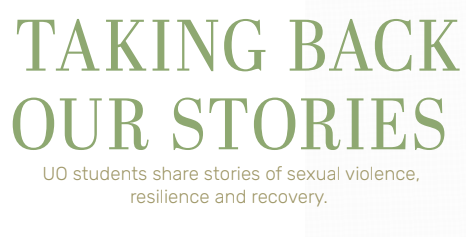
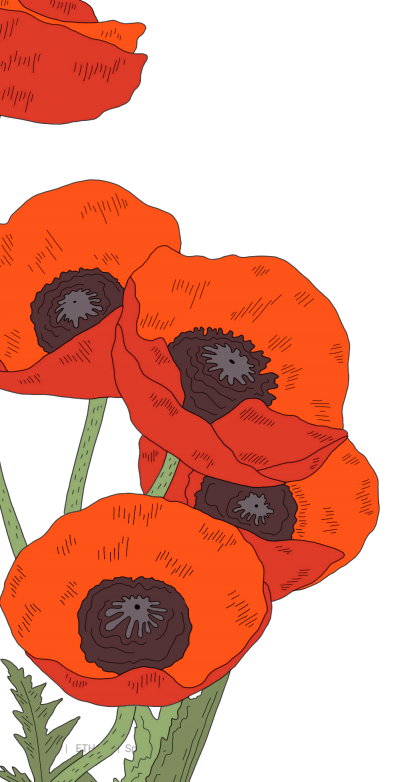
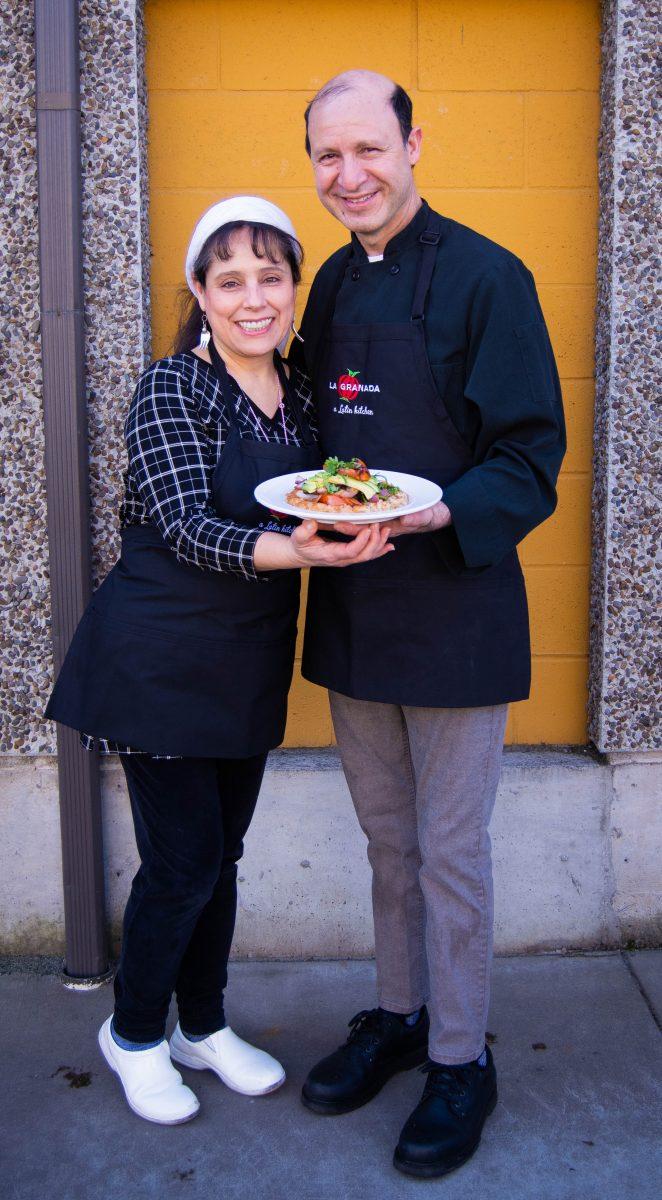
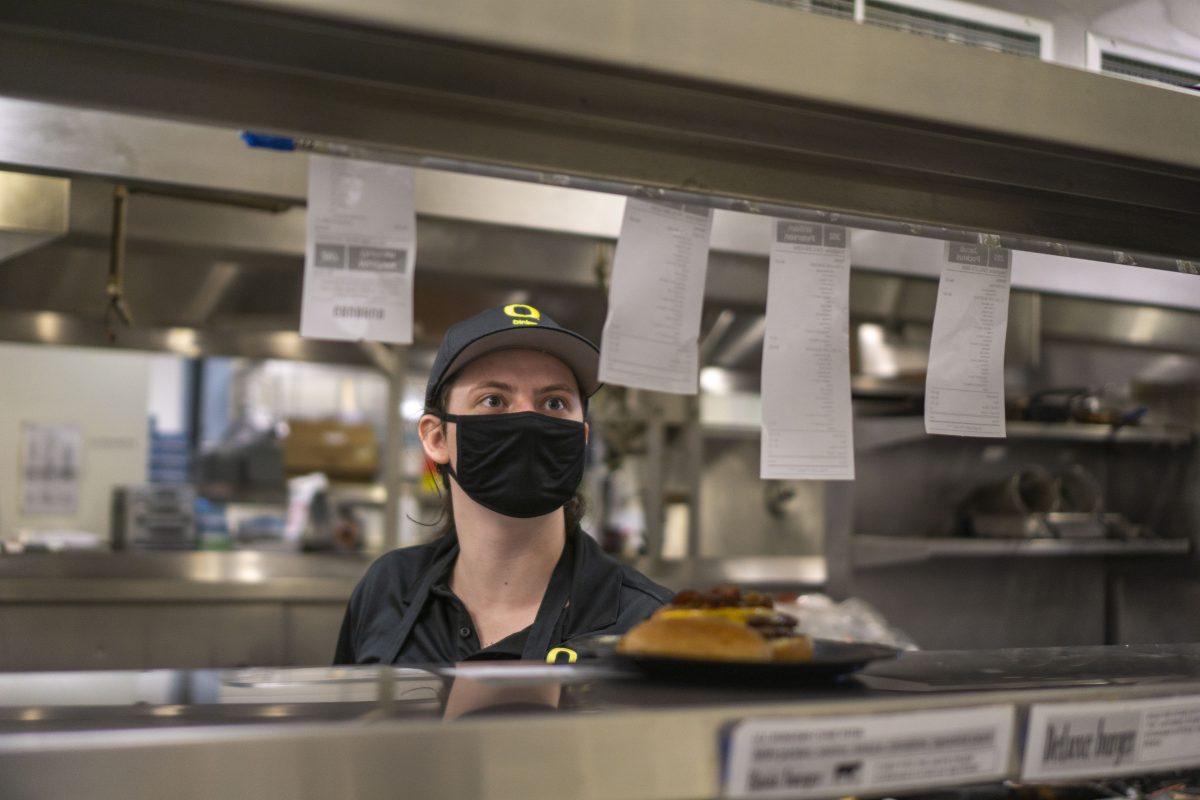
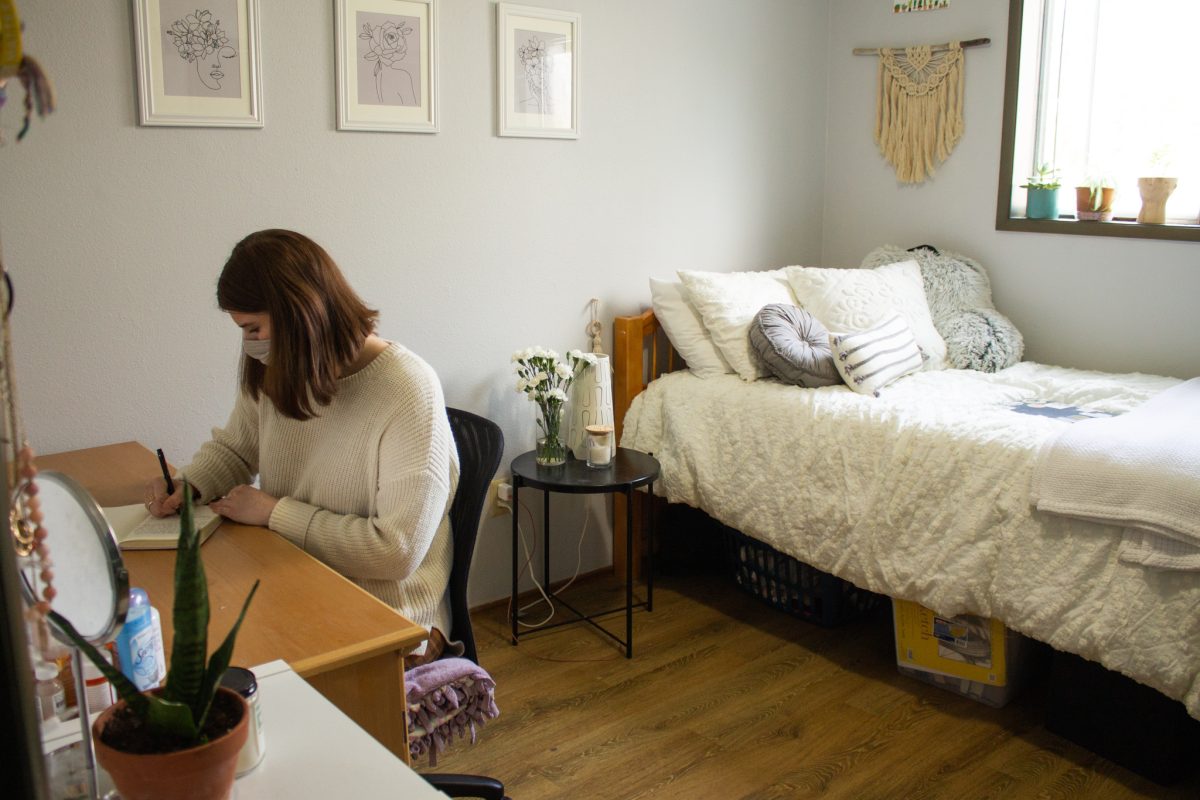
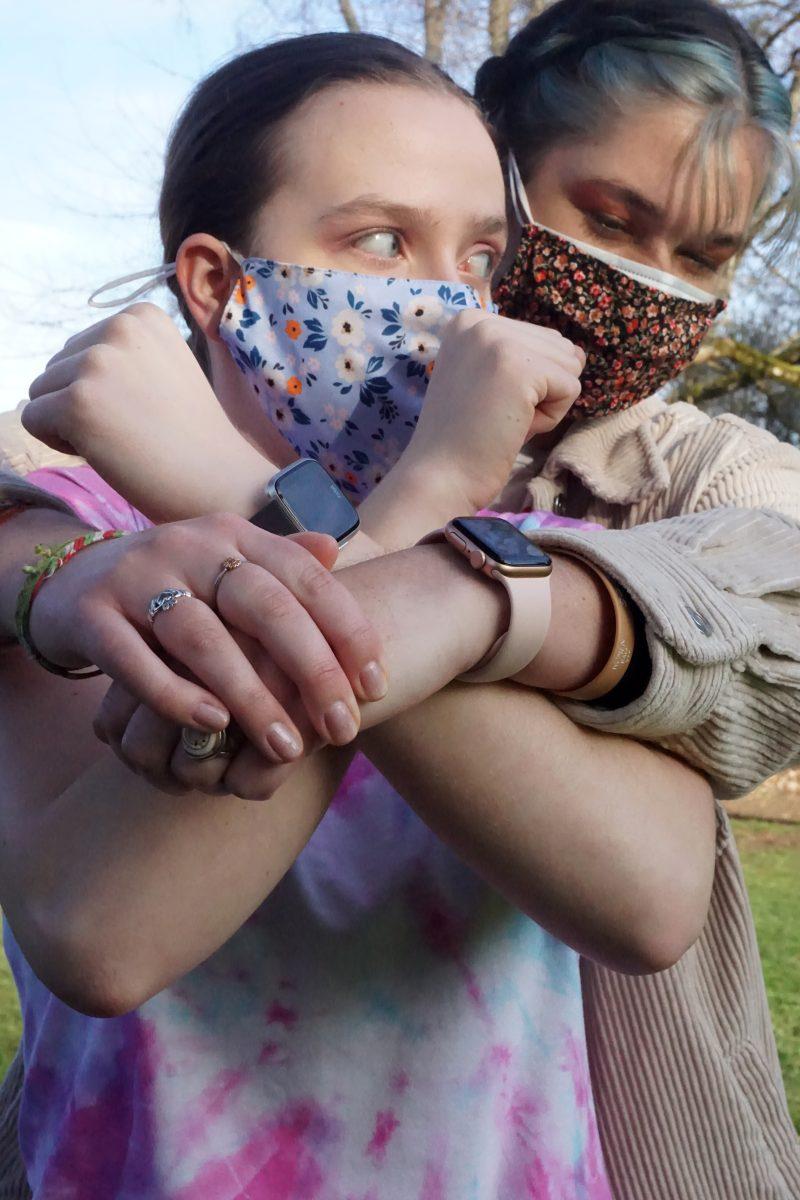


![[Photo Courtesy of the Lara Family]
Ruben embraces his beloved childhood goat, Katrina.](https://ethos.dailyemerald.com/wp-content/uploads/2025/05/katrina-1-1060x1200.jpg)



